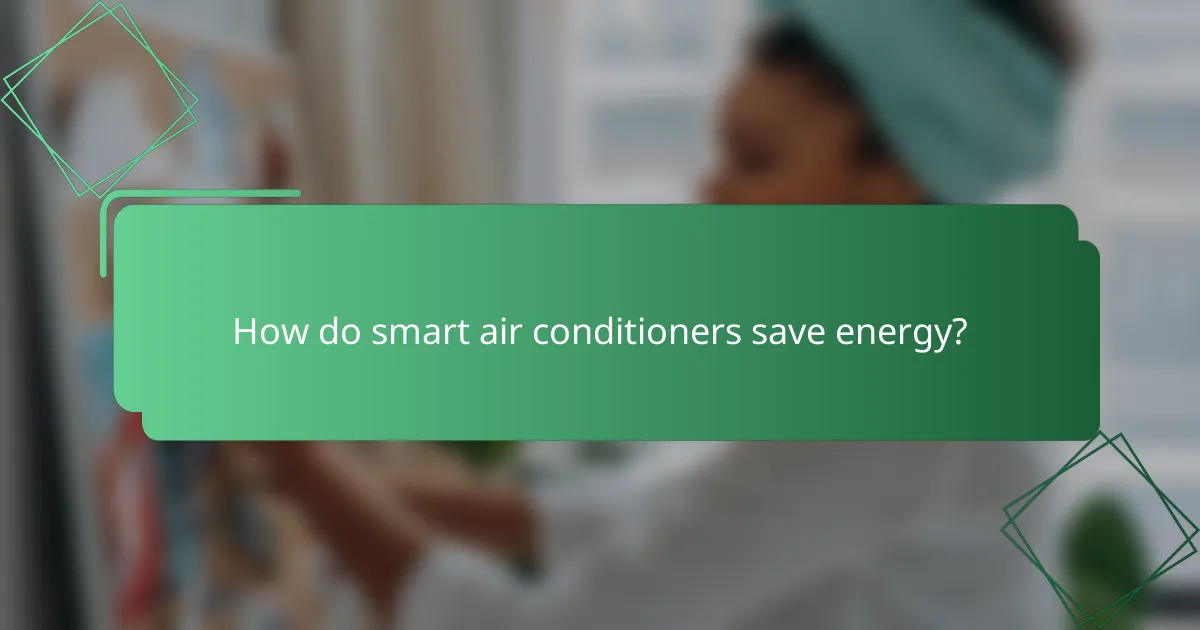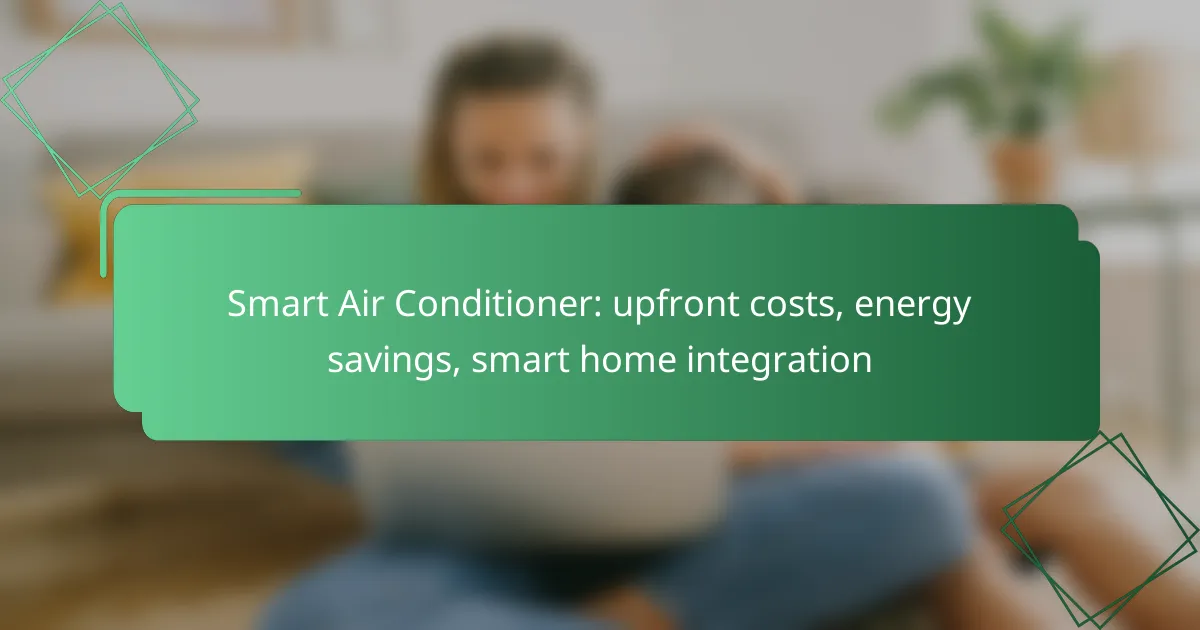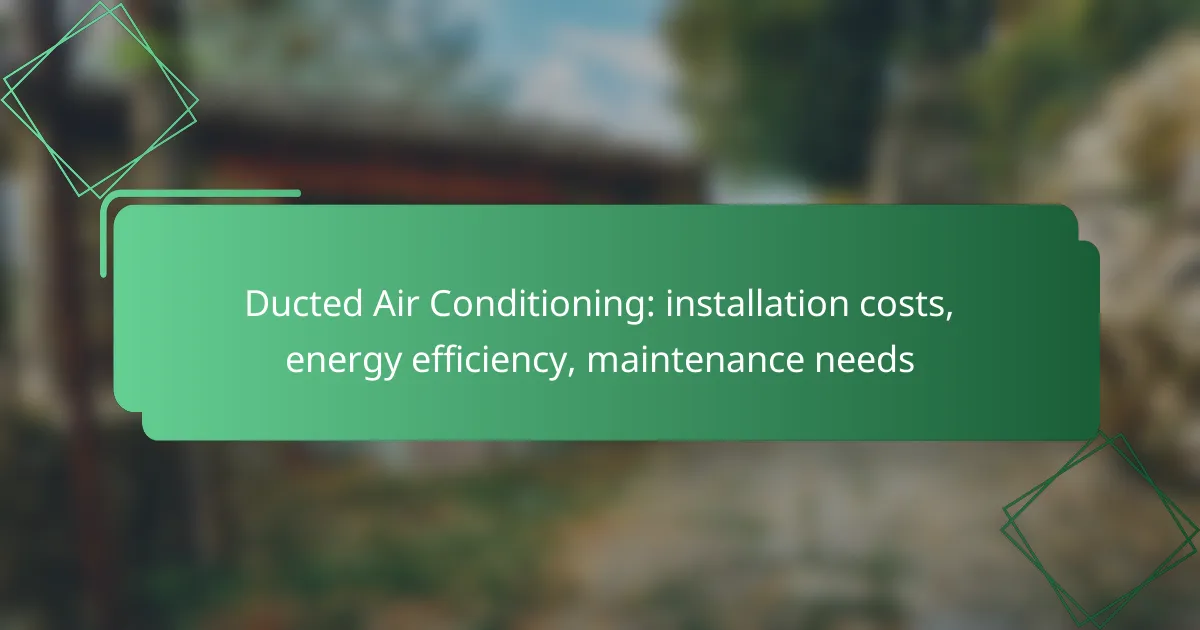Smart air conditioners offer a modern solution for cooling your home, with upfront costs typically ranging from several hundred to over a thousand pounds, including installation. These units not only optimize energy consumption through advanced technology but also seamlessly integrate with smart home systems, allowing for remote control and automation. By investing in a smart air conditioner, homeowners can enjoy enhanced comfort while potentially reducing their energy bills.

What are the upfront costs of smart air conditioners in the UK?
The upfront costs of smart air conditioners in the UK typically range from several hundred to over a thousand pounds, depending on the model and features. These costs include the purchase price of the unit itself and any installation expenses that may arise.
Average purchase price
The average purchase price for smart air conditioners in the UK generally falls between £400 and £1,500. Basic models with essential features tend to be on the lower end, while high-end units with advanced functionalities, such as Wi-Fi connectivity and energy monitoring, can reach the upper range.
When selecting a unit, consider energy efficiency ratings, as higher-rated models may offer long-term savings despite a higher initial cost.
Installation costs
Installation costs for smart air conditioners can vary significantly, typically ranging from £100 to £500. Factors influencing these costs include the complexity of the installation, the type of unit, and local labor rates.
It’s advisable to obtain quotes from multiple installers to ensure competitive pricing. Additionally, check if the installation service includes any warranties or follow-up support.
Financing options
Many retailers and manufacturers in the UK offer financing options for smart air conditioners, allowing customers to spread the cost over several months. Common options include interest-free installments or low-interest loans, making it easier to manage upfront expenses.
Before committing, review the terms carefully to understand any fees or penalties associated with early repayment. Some energy companies may also provide incentives or rebates for purchasing energy-efficient models, further reducing overall costs.

How do smart air conditioners save energy?
Smart air conditioners save energy by optimizing cooling processes through advanced technology and automation. They adjust settings based on real-time data and user preferences, leading to reduced energy consumption compared to traditional units.
Energy efficiency ratings
Energy efficiency ratings, such as SEER (Seasonal Energy Efficiency Ratio) and EER (Energy Efficiency Ratio), indicate how effectively an air conditioner uses electricity. Higher ratings mean better efficiency, with SEER ratings typically ranging from the low teens to mid-twenties. Choosing a unit with a high rating can lead to significant long-term savings on energy bills.
Smart scheduling features
Smart scheduling features allow users to program their air conditioners to operate only when needed, reducing unnecessary energy use. For example, you can set the unit to cool your home before you arrive and turn off while you’re away. Many models also offer geofencing, which adjusts settings based on your location, ensuring optimal efficiency.
Comparative savings vs. traditional units
Smart air conditioners can save users anywhere from 10% to 30% on energy costs compared to traditional models. This is due to their ability to adapt to usage patterns and optimize performance. Additionally, the initial investment in a smart unit may be offset by these savings over time, making them a cost-effective choice in the long run.

What smart home integrations are available for air conditioners?
Smart air conditioners can integrate with various smart home systems, enhancing convenience and energy efficiency. These integrations allow users to control their units remotely, automate settings, and synchronize with other smart devices in their homes.
Compatibility with smart home platforms
Smart air conditioners typically work with popular smart home platforms such as Google Home, Amazon Alexa, and Apple HomeKit. When choosing an air conditioner, check for compatibility with your existing smart home ecosystem to ensure seamless integration.
Some models may require a specific hub or bridge to connect to these platforms, while others offer direct Wi-Fi connectivity. Always verify the integration capabilities before purchasing to avoid compatibility issues.
Control via mobile apps
Most smart air conditioners come with dedicated mobile apps that allow users to control settings from anywhere. These apps enable adjustments to temperature, fan speed, and scheduling, providing flexibility for users on the go.
Look for apps that offer user-friendly interfaces and additional features such as energy consumption tracking or maintenance reminders. This can help you optimize usage and maintain your unit effectively.
Voice assistant integration
Many smart air conditioners support voice commands through assistants like Amazon Alexa or Google Assistant. This feature allows for hands-free control, making it easy to adjust settings without needing to use your phone.
To utilize voice control, ensure that your air conditioner is compatible with your chosen voice assistant and that you have set up the necessary skills or actions in the respective app. This integration can enhance user experience and convenience significantly.

What are the benefits of smart air conditioners?
Smart air conditioners offer enhanced comfort, energy efficiency, and integration with smart home systems. These devices allow users to control their cooling environment remotely, potentially leading to significant energy savings and increased property value.
Enhanced comfort control
Smart air conditioners provide precise temperature control and can adapt to user preferences. Many models allow for scheduling, enabling the unit to cool spaces before occupants arrive home, ensuring optimal comfort at all times.
Some systems utilize sensors to detect occupancy and adjust settings accordingly, which can enhance comfort while conserving energy. This feature is particularly useful in larger homes where different rooms may have varying cooling needs.
Remote monitoring capabilities
With smart air conditioners, users can monitor and adjust settings from their smartphones or tablets, regardless of their location. This remote access allows for real-time adjustments, ensuring that the home remains comfortable even when occupants are away.
Many smart units also provide usage reports, helping users understand their energy consumption patterns. This information can guide decisions on when to run the air conditioner for maximum efficiency and cost-effectiveness.
Potential for increased property value
Installing a smart air conditioner can enhance a property’s appeal to potential buyers. Features such as energy efficiency and advanced technology are increasingly sought after in the real estate market.
Moreover, homes equipped with smart technology often command higher prices. Investing in a smart air conditioning system can be a strategic move for homeowners looking to increase their property’s market value while enjoying immediate benefits in comfort and savings.

What factors should you consider when choosing a smart air conditioner?
When selecting a smart air conditioner, consider factors such as size and capacity, brand reputation, and warranty and support options. These elements will significantly impact your overall satisfaction and efficiency of the unit.
Size and capacity
The size and capacity of a smart air conditioner are crucial for effective cooling. Units are typically rated in BTUs (British Thermal Units), and choosing the right capacity ensures optimal performance without wasting energy. For example, a room of about 400 square feet may require a unit with a capacity of around 8,000 to 10,000 BTUs.
To determine the appropriate size, consider factors like room insulation, ceiling height, and the number of windows. A unit that is too small will struggle to cool the space, while an oversized unit may cycle on and off frequently, leading to inefficiency.
Brand reputation
Brand reputation plays a significant role in the reliability and longevity of your smart air conditioner. Established brands often have a track record of quality and customer satisfaction, which can provide peace of mind. Look for reviews and ratings from other consumers to gauge performance and reliability.
Additionally, consider brands that offer innovative features, such as energy-saving modes and user-friendly apps for remote control. A reputable brand is more likely to provide consistent updates and improvements to their smart technology.
Warranty and support options
When purchasing a smart air conditioner, review the warranty and support options available. A good warranty typically covers parts and labor for at least one to two years, with some brands offering extended warranties for additional peace of mind. This can save you money on repairs if issues arise.
It’s also essential to check the availability of customer support. Brands with responsive customer service can help troubleshoot problems quickly, ensuring that your unit operates efficiently. Look for options like online chat, phone support, and comprehensive FAQs to assist you after purchase.










